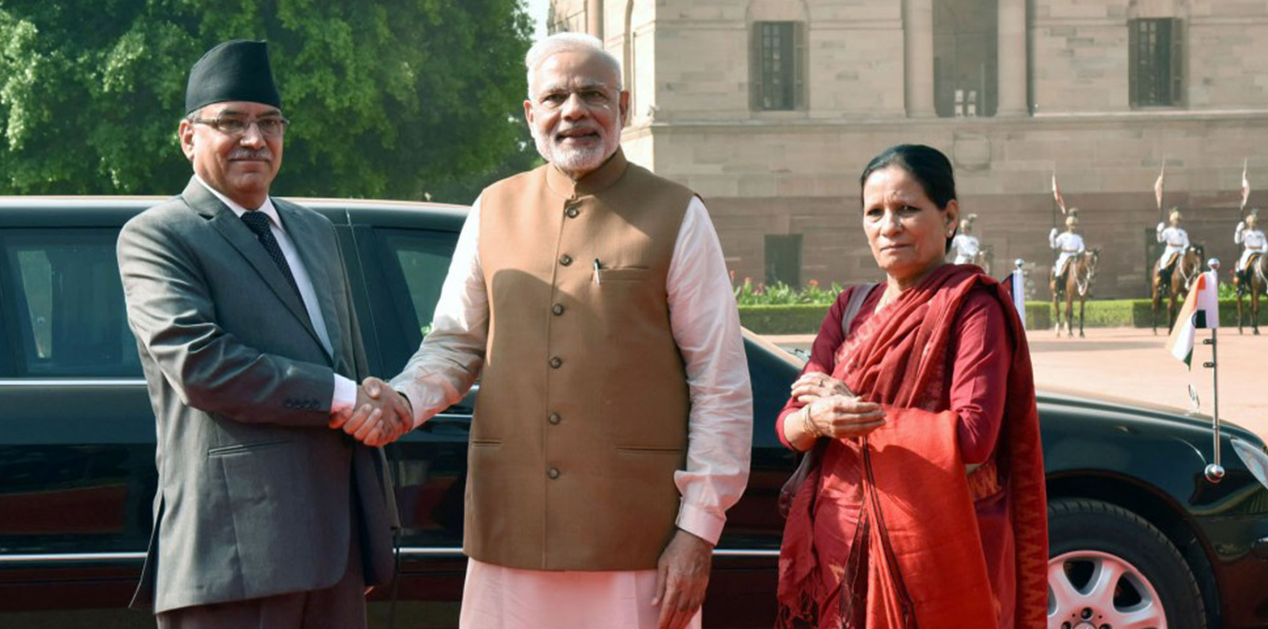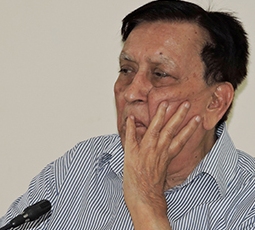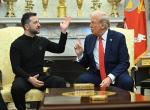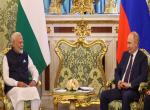The Nepalese Prime Minister Pushpa Kamal Dahal, accompanied by his wife Sita Dahal, arrived at New Delhi on September 15, 2016 on a four day official visit. This was Prime Minister Dahal's first overseas visit since taking over last month (August 2016), replacing the controversial CPN-UML leader K P Sharma Oli whose 9-month rule (Oct. 2015 to July 2016), was marked by a sense of open confrontation with New Delhi at a level never witnessed in recent times.
PM Dahal was accompanied by over 100 strong delegation of including ministers, lawmakers, senior officials, businessmen and journalists. The composition and size of the delegation was clearly designed to convey a strong message to the Indian side that the new coalition government of Nepali Congress and Maoist-Center, headed by Dahal, was determined to change the trajectory of bilateral relation to one of closer all round cooperation. It may also be mentioned here that by visiting India before China, the PM deliberately tried to correct his pro-China image, as was perceived during his first short lived earlier tenure (Aug. 2008 to May 2009). The optics of this move was not missed either in New Delhi or in Beijing.
In terms of official engagements, PM Dahal met almost the entire leadership in New Delhi's power structure. He held wide ranging bilateral talks with his Indian counterpart PM Narendar Modi, Minister of External Affairs Sushma Swaraj, Home Minister Rajnath Singh and Finance Minister Arun Jaitley and called on President Pranab Mukherjee. Dahal also had separate meetings with National Security Advisor Ajit Doval, BJP General Secretary Ram Madhav, Bihar Chief Minister Nitish Kumar, Congress leader Karan Singh and NCP MP DP Tripathi.
At the conclusion of their official talks, on September 16, a 25-point Joint Communique was issued by the two Prime Ministers. For record, this was conspicuously missing when his predecessor K P Shama Oli had visited New Delhi earlier this year. The two Prime Ministers also addressed the media after their meeting. During the media briefing at Hyderabad House in New Delhi, PM Dahal said that he had wide ranging exchange of views covering all substantive issues, focusing on initiating concrete steps to elevate bilateral relations to a new height in all spheres-political, economic, social and cultural. Expressing gratitude toward his Indian counterpart for the warm welcome upon his arrival, PM Dahal said that he shared the vision of a meaningful partnership that was crucial to unlock the huge potentials for 'our mutual benefits'. He added that Nepal was convinced that without economic prosperity, political transformation cannot be possible. PM Dahal added that he shared PM Modi’s view that trust and confidence were the pre-requisites of strong and sustainable friendly relations and to ensure this, “we should respect each other’s sensitivities and concerns in a spirit of good neighbourliness”.
PM Modi, in his address to the media, paid tribute to Dahal's leadership and said “we commend the role you have personally played in strengthening democratic institutions in Nepal and wish every success”. PM Modi described his meeting with Dahal as a “significant day in the history of Nepal-India relations”. He expressed confidence that PM Dahal will successfully implement the constitution through inclusive dialogue, accommodating the aspirations of all sections of the diverse society of Nepal. On this sensitive issue, Dahal publicly committed that resolving the Madhes crisis would be his top priority. Stating that trade, connectivity, development projects and mutual investments were the key pillars of “our partnership with Nepal”, PM Modi said: “India’s initiatives for open sky, cross-border power trade, transit routes and cross-border connectivity would directly benefit Nepal and help strengthen our economic partnership.”
India has decided to focus on economic and power projects for the time being. The two countries signed three agreements for upgrading Tarai highways and an additional line of credit for new projects such as Phase-2 of Tarai roads, power transmission lines, sub-stations and a polytechnic. Modi also announced a credit of $750 million for earthquake re-construction which has been delayed. This refers to three power projects — Pancheshwar, Arun III and upper Karnali. The two PMs agreed to set up a mechanism to oversee the progress of projects on a regular basis and take necessary steps to expedite their implementation. It was decided that issues like irrigation, inundation, flood etc. would be discussed in the next meeting of the Joint Committee on Water Resources at the Secretary level. MoUs were also signed for the development of tourism and health care sectors, co-operation in Traditional Medicine and on tourism co-operation, including development of Buddhist and Hindu pilgrim circuits.
Prime Minister Dahal returned on September 18. Addressing a press conference at the Tribhuvan International Airport, Dahal described the visit as successful as it helped take bilateral ties to a new height. He clarified that the 25-point joint statement would not affect Nepal’s relation with China since ‘dimensions of Nepal’s relation with India were different from the dimensions of Nepal’s relation with China’. Nepal’s ‘deep relations’ with India would not affect the bilateral relations between Nepal and China, he stressed. The PM also said that he was committed to implementing the constitution by taking all sides on board.
As expected, the opposition CPN-UML was quick to criticize the outcome of the visit. Former prime minister and CPN-UML Chairman KP Sharma Oli said that the constitution cannot be amended to ‘appease foreigners or according to the whims of political leaders’. It can be done only for the prosperity and betterment of the country.He alleged that some Madhesi leaders, who became ministers several times, had been provoking the Madhesi people.“These feudal people, who themselves are racists”, have been provoking the people, he quipped. He also criticised the government for sending special envoys to India and China immediately after formation of the government. “What had happened to Nepal-India relations or to Nepal-China relations that the government had to send special envoys?” he wondered. Oli went on to say that his party would not accept the 25-point joint communiqué as it ‘undermined the independence of Nepal’. He specifically referred to the clause stating, “Nepal agreed with the Indian view that imperfections of the Constitution should be redressed through an amendment.”
A section in Dahal’s own party (CPN-Center), criticised the joint agreement stating that the wordings of item 11 should have carried more diplomatic finesse to make things ‘more comfortable’. Some foreign policy experts have expressed concerns that ‘Nepal’s independent handling of foreign policy, has been compromised’. A section of the Maoist leaders were unhappy with Dahal’s way of dealing with India as “New Delhi has not changed its strategy about Nepal and the Maoist party”. Within the Maoist party, the suspicion about India seems to be a manifestation of the deep mistrust. They also said that Dahal should not have raised the issue of constitution in New Delhi, as it was an internal issue.
According to sources, Dahal tried to assuage the leaders’ concerns, saying Indian support and goodwill was a must to implement the constitution and ensure timely elections and that it was not good to annoy India. Later, party spokesperson Pampha Bhusal said the party concluded that Dahal’s visit “was historic and largely successful”.
Meanwhile, Ministry of Foreign Affairs (Sept 20) defended some of the contents of the joint communiqué saying that some media reports and experts had taken exception to items 11 and 13 of the joint statement. Clarifying the position on item 11, the MoFA stressed that the principle of Nepal’s independent handling of foreign policy has not been compromised. MoFA said, “it is a set international practice that many countries work together and hold similar views in the UN and other international organizations”. “Nepal has been working and coordinating with India and China and other countries for the common concern and well-being of least developed countries and other issues in many international forums and avenues as per the necessities,” MoFA added. Further adding, “Nepal has already made its commitment to support India for its UN Security Council bid,” MoFA clarified that this was also agreed upon during the Third Meeting of Joint Commission held in Kathmandu in July 26, 2014, jointly chaired by then foreign minister of Nepal Mahendra Bahadur Pandey and his Indian counterpart Sushma Swaraj.
MoFA further clarified regarding point no. 13 on India-assisted projects in Nepal, stating that the two sides agreed to set up an oversight mechanism comprising senior officials from the Embassy of India in Kathmandu and the Government of Nepal, which will review progress together, and that this could not cause any misunderstanding as the oversight mechanism to monitor the progress in bilateral projects will comprise officials from the Indian Embassy and Nepal Government.
The Indian Prime Minister accepted PM Dahal’s invitation to visit Nepal, dates for which would be will be finalised soon. Despite media criticism and the high decibel campaign launched by former PM Oli and his party, it is generally agreed that PM Dahal’s visit was timely and its overall impact was one of restoring ‘sanity’ in bilateral relations. For how long this bonhomie will continue and relations develop further from here on will be watched with keen interest both in Kathmandu and New Delhi and possibly, in Beijing too.
(Based on Media Reports)
Published Date: 4th October 2016, Image Source: http://www.thehindu.com
(Disclaimer: The views and opinions expressed in this article are those of the author and do not necessarily reflect the official policy or position of the Vivekananda International Foundation)











Post new comment